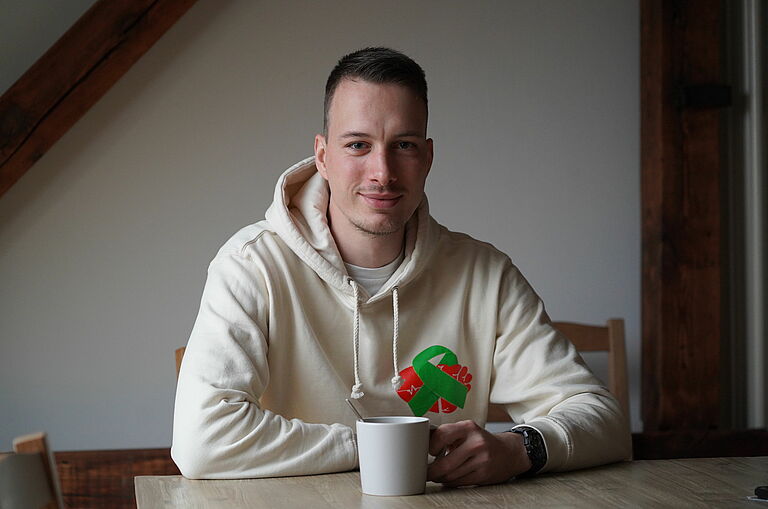Marco Krille has done it. He has overcome the destructive aspects of his life. It is a miracle that many have made possible. The man from Berlin-Buch is 32 years old. His life has taken him to many places: Frankfurt am Main, Mannheim, Hamburg, Schwerin. Jobs and training were the reason. He tried his hand twice as a chef, twice as a waiter in the catering industry and even tried his hand at rapping. "Started a lot, didn't finish anything", as he says of himself. It went on like that for a long time. But that has changed radically in recent years. In July 2022, he graduated as an office management assistant. Soon he will even be able to help others as a "recovery counsellor". Ten years ago, Marco Krille's life looked very different.
Bethel - Many steps back into life


"People with mental illness need trust and acceptance. I want to tell people that someone like me can make it."
His life was shaken
Looking back: When Marco Krille lost his father to suicide in 2012, a world collapsed for him. The note he found in the letterbox with his necklace to say goodbye read: "For Marco, I love you! Dad." His father had always encouraged and supported him. That gave him strength. "My father always said: You can do it!" But then his father couldn't do it himself. Marco Krille lost his bearings and staggered through the days.
For five years, he was always on the verge of falling. He tried to protect himself - and still had the strength to get help. He found a psychologist who understood what was going on: "You need to go to hospital as soon as possible." Today, Marco Krille says: "It was the best thing that could have happened to me." He stayed there for seven weeks. Plenty of time to think. "I understood why I am the way I am. His mother drank alcohol, even during the pregnancy. I have my father to thank for the fact that I was born at all." After his hospitalisation, Marco Krille was supported by the Hoffnungstaler Stiftung Lobetal's GPVA (Community Psychiatric Association and Work Projects). "After my hospital stay, I had to learn to reorganise my life. There were so many things to sort out." Then, after two years, he was overcome by another crisis.

It was during this time that he had a conversation with his mentor Simon Oppel. Marco Krille remembers the day it took place very clearly. "Everything okay with you?" he asked him. "Yes, everything's fine. What could be wrong?" But nothing was okay. He was on the edge again. "My carer sensed that something was wrong." He followed up and didn't let up. In the end, Marco Krille told him what was going on. He was on the verge of suicide.
Then there wasn't much more to talk about. Simon Oppel immediately took him to the hospital's emergency room. "I couldn't have done it on my own this time. That time was the lowest point in my life, the lowest point after my father's death," Marco Krille looks back. Once again, he completed the full programme at the clinic, and yet it was different to the first time. He realised even better that he could do it. Marco Krille completed his training as an office management assistant with the help of GPVA employees, who stabilised and motivated him.
It was during this time that Marco Krille first heard about the concept of a recovery counsellor. He harboured the desire to be there for others. He therefore began further training to become a recovery counsellor, which he will complete this year. "People with mental illness need trust and acceptance," he says. "I want to tell people that someone like me can also make it."
Text and photos: Wolfgang Kern
This story simply told
After the death of his father, Marco Krille experienced several psychological crises. Specialists at the Lobetal Foundation helped the young man to recover. He has even completed vocational training. Now he wants to help others.
Would you like to find out more?
Offers & services
The Evangelical Hospital Königin Elisabeth Herzberge is located in Berlin-Lichtenberg. Its thirteen specialist departments include a Department of Psychiatry, Psychotherapy and Psychosomatics, which offers a comprehensive range of treatments for psychiatric and psychosomatic illnesses. There is also an inpatient service for emergencies. A (partial) inpatient and outpatient treatment programme is also planned.







